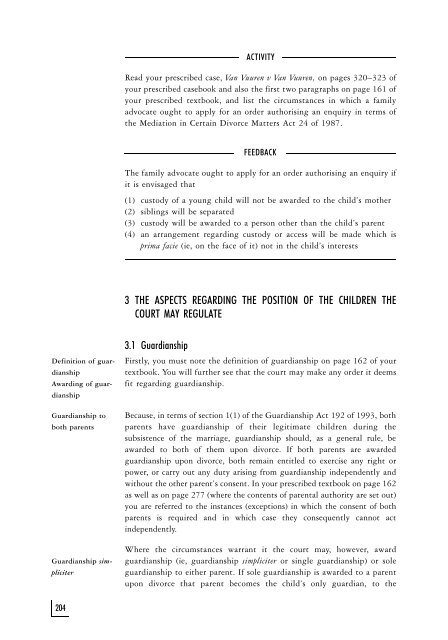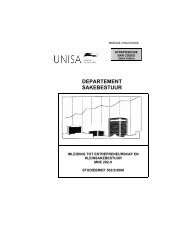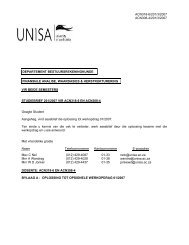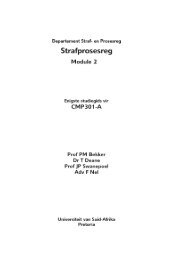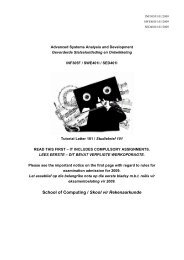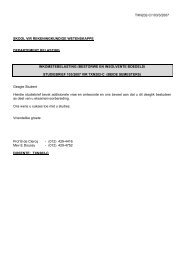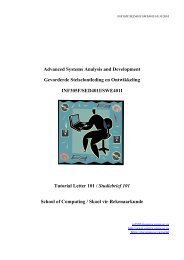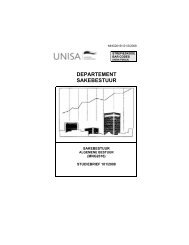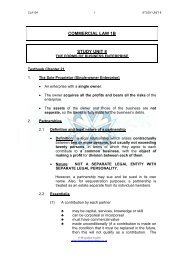key to the study guide - Name
key to the study guide - Name
key to the study guide - Name
You also want an ePaper? Increase the reach of your titles
YUMPU automatically turns print PDFs into web optimized ePapers that Google loves.
Definition of guardianship<br />
Awarding of guardianship<br />
Guardianship <strong>to</strong><br />
both parents<br />
Guardianship simpliciter<br />
204<br />
ACTIVITY<br />
Read your prescribed case, Van Vuuren v Van Vuuren, on pages 320±323 of<br />
your prescribed casebook and also <strong>the</strong> first two paragraphs on page 161 of<br />
your prescribed textbook, and list <strong>the</strong> circumstances in which a family<br />
advocate ought <strong>to</strong> apply for an order authorising an enquiry in terms of<br />
<strong>the</strong> Mediation in Certain Divorce Matters Act 24 of 1987.<br />
FEEDBACK<br />
The family advocate ought <strong>to</strong> apply for an order authorising an enquiry if<br />
it is envisaged that<br />
(1) cus<strong>to</strong>dy of a young child will not be awarded <strong>to</strong> <strong>the</strong> child's mo<strong>the</strong>r<br />
(2) siblings will be separated<br />
(3) cus<strong>to</strong>dy will be awarded <strong>to</strong> a person o<strong>the</strong>r than <strong>the</strong> child's parent<br />
(4) an arrangement regarding cus<strong>to</strong>dy or access will be made which is<br />
prima facie (ie, on <strong>the</strong> face of it) not in <strong>the</strong> child's interests<br />
3 THE ASPECTS REGARDING THE POSITION OF THE CHILDREN THE<br />
COURT MAY REGULATE<br />
3.1 Guardianship<br />
Firstly, you must note <strong>the</strong> definition of guardianship on page 162 of your<br />
textbook. You will fur<strong>the</strong>r see that <strong>the</strong> court may make any order it deems<br />
fit regarding guardianship.<br />
Because, in terms of section 1(1) of <strong>the</strong> Guardianship Act 192 of 1993, both<br />
parents have guardianship of <strong>the</strong>ir legitimate children during <strong>the</strong><br />
subsistence of <strong>the</strong> marriage, guardianship should, as a general rule, be<br />
awarded <strong>to</strong> both of <strong>the</strong>m upon divorce. If both parents are awarded<br />
guardianship upon divorce, both remain entitled <strong>to</strong> exercise any right or<br />
power, or carry out any duty arising from guardianship independently and<br />
without <strong>the</strong> o<strong>the</strong>r parent's consent. In your prescribed textbook on page 162<br />
as well as on page 277 (where <strong>the</strong> contents of parental authority are set out)<br />
you are referred <strong>to</strong> <strong>the</strong> instances (exceptions) in which <strong>the</strong> consent of both<br />
parents is required and in which case <strong>the</strong>y consequently cannot act<br />
independently.<br />
Where <strong>the</strong> circumstances warrant it <strong>the</strong> court may, however, award<br />
guardianship (ie, guardianship simpliciter or single guardianship) or sole<br />
guardianship <strong>to</strong> ei<strong>the</strong>r parent. If sole guardianship is awarded <strong>to</strong> a parent<br />
upon divorce that parent becomes <strong>the</strong> child's only guardian, <strong>to</strong> <strong>the</strong>


